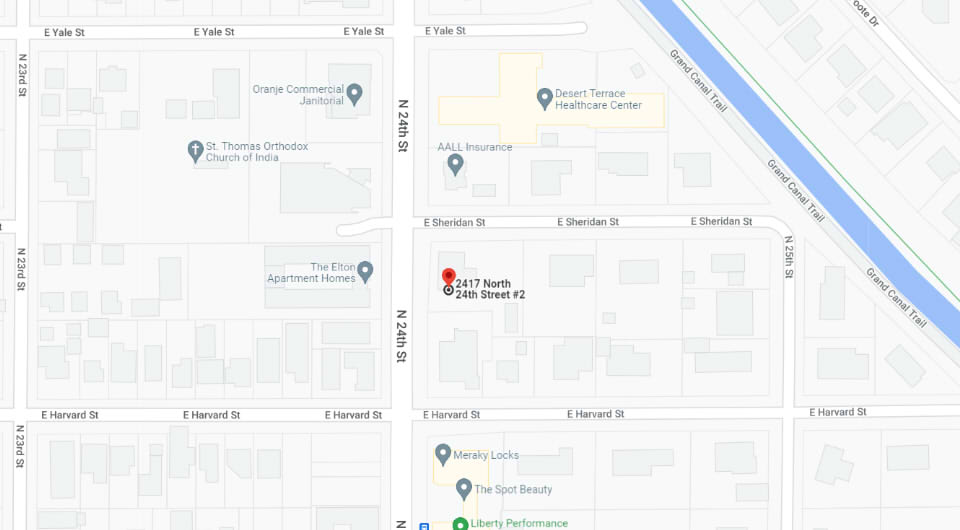When you enter a hospital, you are entrusting your health and life to medical professionals, granting you the right to benefit from their expertise, knowledge, and training. Each hospital has a responsibility to offer as good care as is generally provided by other healthcare providers in the state. However, if you sustain any sort of injury or harm while undergoing treatment at a hospital, you have the right to sue the institution for hospital malpractice.
Our attorneys at the Phoenix Personal Injury Attorney Law Firm have extensive experience representing clients who are victims of hospital negligence. These claims are often more challenging and complex than other sorts of litigation, but our lawyers are fully aware of the seriousness of the matter and are ready and equipped to assist victims in obtaining the compensation they are entitled to.
What is Hospital Malpractice?
Hospital malpractice is a form of malpractice that is often committed by hospital staff, which could include physicians, nurses, the administration, amongst other hospital employees. This typically refers to any sort of behavior that, either on purpose or unintentionally, has a detrimental impact on a patient's health after being hospitalized or following a medical procedure.
It's often a sort of medical malpractice/negligence, and while the two phrases are sometimes used interchangeably, they're not by definition synonymous. Hospital malpractice is generally viewed as accidental, even though it can have serious consequences and could be the basis for civil action or malpractice claims.
Hospital liability primarily falls under two categories:
- When a healthcare institution is responsible for the actions of a negligent worker
Vicarious liability is a part of personal injury legislation that asserts that an employer, like a hospital, can be held responsible for the mistakes of their employees. As a result, a hospital could be held accountable for medical negligence committed by a doctor, nurse, or any other medical provider who is employed there.
- When a healthcare institution is liable for damage caused by the facility's management
Medical malpractice claims can be filed against hospitals if patients are harmed because the hospital failed to provide a sufficiently safe environment. This could happen as a result of careless hiring and supervision procedures, along with poor equipment maintenance and repair.
Proving Hospital Malpractice In Arizona
Medical malpractice and hospital malpractice are essentially the same. As a result, both cases have a similar burden of proof. Both cases hinge on establishing that a doctor or other healthcare worker acted negligently when administering medical assistance to a patient.
Negligence in the medical field occurs when the treatment provided is not up to par with general industry standards. A patient should be injured as a result of a medical provider's negligence to file a claim for damages.
There are four steps to satisfying the conditions for hospital malpractice. These include:
- Proving that the victim was indeed a legitimate hospital patient.
- Demonstrating that the patient received care that was either negligent or below the acceptable standard;
- Proving that the patient's injuries were caused by poor care; and
- Showing that the patient suffered financial, bodily, or emotional losses due to the injury.
Cases involving hospital malpractice are complex and therefore are best handled by a group of both medical and legal experts. Attorneys who practice in this sector are experts with years of expertise in researching and interpreting both legal and medical information.
If your well-being was affected or you tragically lost a dear one due to hospital malpractice, you could be able to receive compensation for financial damages, reduced quality of life, or emotional suffering and pain. In exceptional circumstances, you could even win a request for punitive damages. The purpose of these particular monetary reparations is to discourage wrongdoers from flagrantly disregarding the lives and welfare of prospective patients.
Hospital Malpractice Causes
There is always the potential for different mistakes and accidents to happen in a hospital. Each day, medical professionals such as nurses, doctors, and technicians have control over their patients' lives, and any oversight or training shortcomings could result in devastating mistakes.
There are several ways in which medical facilities and their employees let the patients down, many of which are entirely avoidable. Many factors can be associated with hospital malpractice, including:
- Inadequately trained personnel.
- Unhygienic procedures or equipment.
- Low nurse-to-patient ratios, for example, due to understaffing.
- Defective or dangerous facilities.
- Faulty or outdated tools.
- Lost lab results.
- Lost records.
- Poor communication.
- A lack of communication.
Poor hospital staff management and hospital oversights both have the potential to cause severe, permanent injuries. Understaffing and insufficient training can lead to problems throughout the facility.
Nursing carelessness is among the most prevalent causes of hospital malpractice. Nursing malpractice can take different forms, including:
- The failure to recognize changes in either vital signs and behavior.
- Failure to adequately evaluate and supervise a patient.
- Medication errors.
- Inadequate patient monitoring.
- Interpreting a patient's record incorrectly.
In addition to the aforementioned, the following are other possible types of mistakes that could happen in a medical facility:
- Anesthesiologist errors.
- Misuse of healthcare equipment.
- Drug contamination.
- Improper postoperative care.
- Equipment breakdown.
- Birth injuries.
- Obstetrical errors.
- Errors in artificial insemination.
- Ignoring or not communicating test results.
- Injury to the patient as a result of being dropped or falling.
- Injury from bed rails or restraints.
- MRI injuries.
- Leaving surgical instruments inside a patient's body.
- Surgery conducted on the wrong part of the body or patient.
Holding a Hospital Liable for Negligent Employees
The majority of healthcare professionals who work in health facilities are independent contractors. However, some of them could be full-time or part-time employees. When deciding whether to file a hospital malpractice case, the distinction in the work status is crucial.
Because hospitals are called to account for the negligence of their personnel, you do have the option of suing both the facility and the specific employee if you've been injured by one of their medical staff members.
On the other hand, if you have been hurt by a medical professional who works as an independent contractor rather than a hospital employee, your compensation is restricted to the independent worker alone, and you probably won't be able to sue the hospital for damages.
Physician Negligence
When a doctor is found guilty of negligence, it typically occurs as a consequence of:
- Negligence during pregnancy and delivery.
- Misdiagnosis.
- Surgical mistakes.
- Mistakes made when administering or prescribing medications.
Doctors also often operate as independent contractors when working in hospitals, as opposed to being hospital employees. This leads to a change in liability.
Normally, you cannot hold a medical facility responsible for carelessness committed by a professional working as an independent contractor. Rather, your only alternative will be to have the offender accountable for whatever damages they have caused.
Nurse Malpractice
The hospital's nurses are responsible for a variety of tasks, and their work is essential to the smooth operation of the facility. Therefore, you could have a valid medical malpractice lawsuit if you suffer harm because a nurse's actions fell short of the acceptable requirements established by the general standards of care.
Some of the cases in which a nurse might be found liable for negligence are as follows:
- Inadequate patient monitoring.
- Failing to record an important vital sign.
- Failing to properly record the vital signs of a patient at the appropriate times.
- Providing the incorrect medication type.
- Failing to accurately enter patients' nursing records into their charts.
- Giving the medication at the incorrect time.
- Administering an incorrect dosage of a medication.
- Failing to respond to a patient's call promptly.
- Not informing the physician in charge of any alarming symptoms or concerns.
- Failing to check for bedsores on a patient.
It is possible to prove negligence by showing any element mentioned above. If you suffer injuries at the hands of a nurse who is employed by the hospital, you can pursue legal action against both the facility and the nurse.
Arizona's Comparative Negligence Rule
In personal injury claims, especially those involving hospital negligence, Arizona applies the comparative negligence rule to establish who is at fault. According to this rule, when assessing who was at fault for the damage, the court assesses and evaluates the recklessness of all parties involved in the case, including the victim.
Each participant is then allocated a percentage of culpability for the incident. If the plaintiff is found to be partially responsible for their injuries, their compensation amount is decreased by the percentage of liability. This doesn't imply that a victim will always be held accountable for some portion of their misfortune. The victim may bear no responsibility at all.
For instance, if the court determines that the victim bears 40% of the blame for the damages, which were initially valued at $30,000, the award is lowered by $12,000 in damages. As a result, the victim could now seek $18,000 in compensation as the maximum amount.
Who Can Be Taken to Court for Hospital Malpractice?
An Arizona hospital malpractice suit could be filed against any licensed medical professional. A licensed medical professional is an individual, organization, or institution that has been authorized by the state to offer medical services, healthcare, nursing services, or any health-related services.
This comprises but is not restricted to doctors, nurses, hospitals, dentists, technicians, staff members of healthcare organizations acting within the course of their profession, and blood banks, plasma collection facilities
Types Of Compensation Available In Hospital Malpractice Claims
Patients who suffer from hospital malpractice could suffer severe, permanent injuries. In most cases, patients are admitted to the hospital for treatment of an existing illness, condition, or accident, and any treatment error or negligence results in new illnesses or worsens their current condition.
A hospital malpractice case will seek compensation for future and current losses, pain, and suffering caused by the institution's negligence.
These could include:
- Additional medical costs.
- Long-term care and therapy.
- Additional operations.
- Lost wages.
- Income loss.
- Child care costs.
- Accommodations for permanent injury.
- The death of a family member or close friend.
- Pain and suffering.
- Emotional and mental trauma.
- Physical rehabilitation.
The following damages could also be sought in a Phoenix hospital malpractice lawsuit involving the untimely loss of a family member:
- Burial costs and funeral expenses.
- Lost future earnings.
- Lost benefits, like insurance coverage.
- Loss of consortium or companionship.
Without a comprehensive examination of a situation and all relevant records, it's challenging to determine compensation in a hospital negligence action. However, the aforementioned categories of damages are often reimbursed in all kinds of malpractice suits.
Factors Influencing Hospital Malpractice Settlement Amounts
Several factors determine the amount of compensation awarded in a hospital malpractice lawsuit. Each case is different, as are the circumstances surrounding it. A hospital malpractice case will carefully evaluate the following utilizing their knowledge and experience together with that of financial and medical professionals to project reasonable claim amounts in a case:
- The seriousness of the injuries.
- the severity of the suffering and distress.
- The loss of one's ability to earn.
- The age of the patient.
- A deterioration in one's quality of life.
Several kinds of losses are hard to value since they are emotional and personal. When engaging with a patient and their loved ones to attribute calculations to the damages in particular, an expert hospital malpractice lawyer will exercise considerable caution and consideration.
Arizona's Statute of Limitations for Hospital Malpractice
In Arizona, there is a statute of limitations that must be met before a hospital malpractice claim can be filed. There is often a two-year window in which to file a claim for medical malpractice from the time the operation that caused the patient harm or deterioration occurred.
However, various factors can change Arizona's statute of limitations by shortening or extending the time a person has to file a claim.
What Legal Actions Am I Entitled To If I'm a Victim of Hospital Malpractice?
If you have been a patient in a hospital (irrespective of the institution's safety rating) and believe you have been a victim of a medical error or hospital malpractice, you could be able to seek compensation. To successfully file your case, you should show that the institution or an employee of the institution engaged negligently, like using contaminated materials or failing to consult with other healthcare professionals, and that this caused substantial harm. Observing a nurse who hasn't washed their hands isn't enough to file a malpractice claim. Injuries or damages must result from the nurse's negligence.
Some individuals could suffer long-term disabilities as a result of hospital malpractice. It would lead to increased medical expenses, missed work days, or a reduction in future potential earnings. It can also result in loss of life in the most severe cases, depriving a family of a loved one.
Every individual who goes to the hospital for treatment should feel safe knowing that the administration and healthcare professionals are responsible for their safety. If a patient has been harmed due to a hospital's deficient safety procedures, employee negligence, or employee incompetence, the facility would be held responsible for compensating the patient.
A hospital malpractice claim could result in the following damages:
- Medical expenses.
- Lost earnings.
- Future wage loss.
- Pain and suffering.
How a Medical Malpractice Lawyer Can Assist You
Hospital malpractice lawsuits can be difficult, labor-intensive, and complex. These lawsuits aren't suitable for the inexperienced since they require a significant amount of financial and mental resources. You require a Phoenix medical malpractice lawyer who has:
- Years of experience in the medical field.
- Knowledge of state malpractice laws.
- Understanding of medical terms and procedures.
- Connections with reputable local medical practitioners.
If you are thinking about or have decided to file a hospital malpractice claim, engaging a professional attorney can help you through the process. A team of medical malpractice lawyers can help ease your mind by:
- Reviewing your case without cost or commitment.
- Retaining the appropriate medical professionals to give a testimony on your behalf.
- Delivering the necessary paperwork, such as court filings and paperwork, accurately and on time.
- Managing all correspondence with the hospitals and the insurance providers.
- Evaluating your current and projected financial losses.
- Determining the degree to which a person has suffered physical, mental, or emotional harm.
- Negotiating a possible settlement with the hospital's insurance provider.
- Filing and presenting your case in court.
While it's not always warranted, most individuals place their trust in the competence of hospitals, physicians, and hospital employees. Each day, medical errors and hospital malpractices occur in hospitals, causing people to suffer injuries and unfortunately pass away.
If you or a loved one has experienced this, you have several options. You can seek monetary compensation for your emotional, physical, and financial well-being. You could also assist curb the appalling rate of hospital malpractice in hospitals countrywide by holding the institution responsible for their incompetence and misdiagnosis.
Contact An Experienced Phoenix Hospital Malpractice Lawyer Near Me
If you or your loved one suffered as a result of hospital malpractice and negligence, the Phoenix Personal Injury Attorney Law Firm can assist you to recover full compensation for your loss and suffering.
Our Phoenix personal injury attorneys have the experience and knowledge to get the job done. We will fight to uphold your rights while holding the hospital accountable for any damages or injuries caused. Contact us today at 602-641-9589 for a free, no-obligation legal evaluation of your claim.










